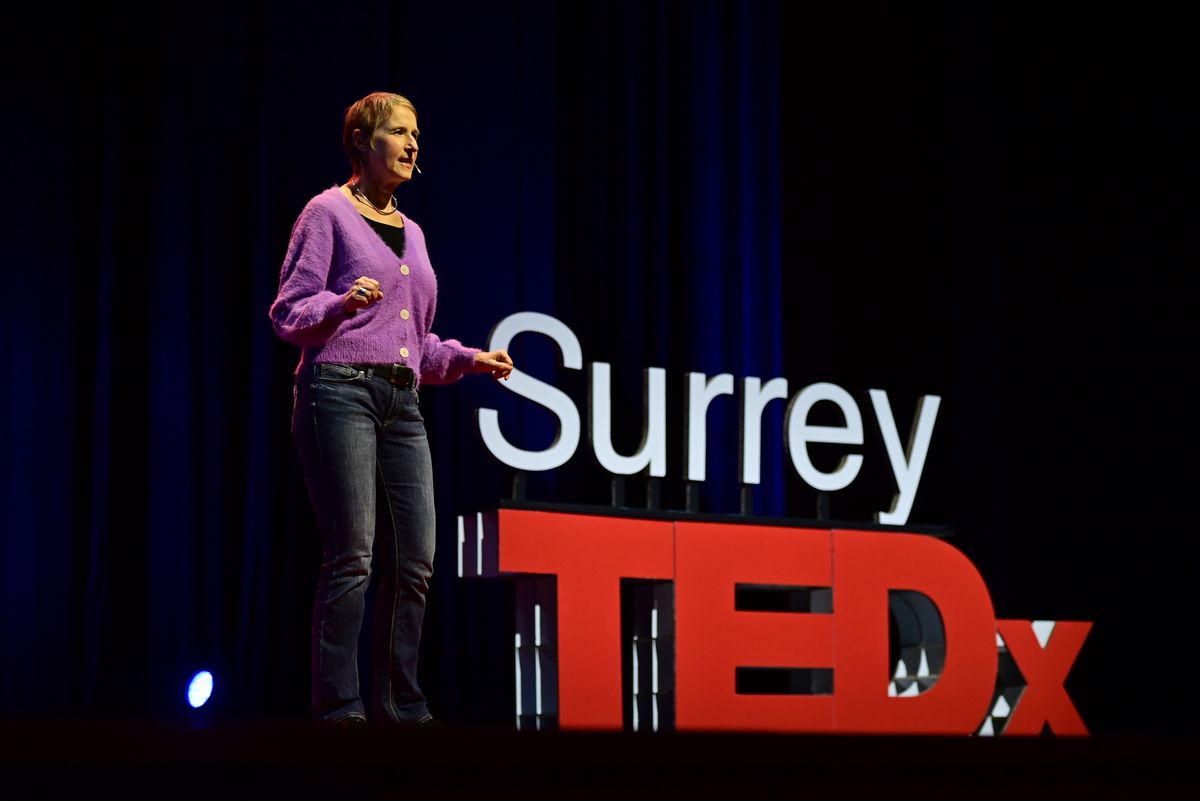My TEDx talk about how stories can make you smarter is finally available online! As I reflect on what an incredible experience it was, I wanted to share a few lessons I learned for everyone who wants to be a better speaker. Note that I knew all these things going in – in fact, I teach them in my courses! But I still had to be reminded to walk the talk myself as I went through the process.
Less is more.
Don’t try to cram everything you’ve learned over the past 40 years into 12 minutes like I did! Seems obvious but, like many people, I suffer from “expertitis”. I think everything I know about Narrative Intelligence is incredibly important and that everyone in the world absolutely must learn it all. So I try to cover too much. The TEDx Surrey team was really great at helping me distill the core idea I wanted to share (my throughline) and build my talk around it. That said, in hindsight, I think I still had too many abstract ideas in there – and I feel like I left a ton of important stuff out. My advice is to get someone to help you distill your big idea worth sharing and be ruthless about cutting everything that doesn’t directly support it. (In Hollywood, they call this “killing your darlings”.)
Tell lots (and lots) of stories.
I’m not just saying this to be self-serving. Every time I introduced an idea in my talk, all the coaches asked me to add a story to illustrate how that concept worked. After watching all other 11 talks multiple times, (plus analyzing a ton of other TED talks), stories seem to be all that people want and remember. It’s been over two months now since our TEDx event, but I still remember Dr. Rob McDermid’s story about realizing that the most powerful thing he could do for his grandmother as she died was simply to sit and hold her hand. In fact, I watched Rob tell this story at least half a dozen times and he made me cry every damn time. Then there was Dr. Sharlene Gill’s story about the cancer patient who was dying and didn’t want his treatments to interfere with his ability to do karaoke with his family. Indigenous scholar Dr. Kevin Lamoureux’s story about his Nation’s tradition of drumming during a hunt to keep their people connected during challenging times. And mental health advocate Suzanne Venuta’s priceless story about the impact of kind neighbours as she grew up in an abusive family. Stories are the most powerful tool in the world for learning and problem-solving. You can never tell too many!
Trust yourself.
Preparing for a TEDx is not for the faint of heart. If you’re fortunate enough to work with a team of coaches and advisors, you will get tons of (often conflicting) feedback about what does and doesn’t work. This covers everything from how to stand and move your arms – to what to wear and how to walk – to facial expressions and voice intonation – to what you actually say and the “political correctness” of your words. Plus everyone you practice on will have their own ideas about what you should do.
However, if your coaches are good, they will remind you that everything they say is just a suggestion. In the end, this is your idea, your talk, your story. If you want to connect with people, you need to be authentic and give it in the way that is most true for you.
Practise. Practise. Practise.
Once we had locked our scripts (6 weeks before the event), our fearless leader Alan Warburton recommended that we treat the next month and a half as if we were training for a marathon. That is, we should practise for 30 minutes every day, six days a week. I admit that at first, I pooh-poohed his suggestion as overkill. But after a few days of practice, I realized he was right. I had to do the talk several times a day to keep it fresh in my mind. Plus there were a million different ways to deliver it and practice gave me the opportunity to test them out. Over those next six weeks, I must have delivered my talk 150 times – in the shower, walking the dog, on the exercise bike. This practice helped me develop critical “muscle memory” so that I could give the whole presentation on autopilot if needed – in the same way that practising the piano or your tennis swing helps you perform without having to think about exactly what to do when.
And I’ll admit – when the big day arrived, I was nervous, despite decades of public speaking experience. In many ways, giving this talk felt more like a theatrical performance than a presentation, as I wanted to connect with the audience cognitively and emotionally. Plus I didn’t have slides to fall back on. Or a clicker to cling to!
When I finally walked into the red circle on that big stage, something amazing happened. All my stress and fear melted away. The second I started to speak, my mind quieted and my talk just flowed out of me, like a stream of energy that had been waiting for that exact moment to be released. I honestly don’t remember much of what happened on stage. But I do recall a powerful feeling of connection with the audience, a sense that we were more than just a bunch of people sitting around a cold theatre. We were learners, seekers, and adventurers on a shared journey to figure out how to make the world better. Together. And that feeling of togetherness gave me the confidence and courage to be vulnerable with them, to share my truth.
In the end, the whole TEDx experience was a powerful growth opportunity, where I (re)learned critical lessons about how to engage others in my mission to use stories to make change, for good. More importantly, I also (re)learned valuable life lessons from my fellow speakers – about humility, courage, leadership and generosity.
If you’re thinking about doing your own talk, or have a TED experience to share, please get in touch. I’d love to hear your story!





